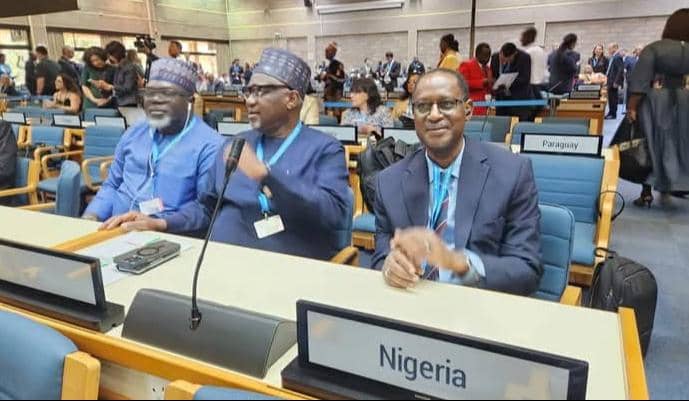By Adamu S Ladan
Nairobi, Kenya – May 31, 2025
Diplomatic shuttles are ongoing at the United Nations Human Settlements Programme (UN-Habitat) following contentious deliberations over the draft 2026 Strategic Plan. The debates, which came to a head during the Africa Group’s internal consultations at the ongoing UN-Habitat Assembly in Nairobi, have exposed deep ideological and geopolitical fractures over the future direction of the agency.
The issue at stake is the proposed inclusion of expansive language on gender identity and human rights—provisions that some member states argue fall outside UN-Habitat’s traditional mandate of sustainable urban development, housing, and infrastructure. Nigeria’s Delegation led by Minister of Housing and Urban Development, Arc Ahmed Musa Dangiwa is actively involved in these discussions.
Development or Ideology?
The Africa Group, backed by several nations from the Middle East and Asia, has raised pointed concerns that the strategic plan is being stretched beyond its technical purview. According to the group, injecting politically and culturally sensitive social frameworks into what should be a development-centered strategy risks undermining the very cohesion, operational focus, and financial viability of UN-Habitat.
“This is not a debate about human dignity or inclusion,” said one African delegate. “It is about scope, sovereignty, and effectiveness. When urban development becomes a proxy battleground for unresolved global ideological debates, the poorest cities in the world lose.”
The Africa Group has insisted that core urban challenges—such as slum upgrading, housing finance, land reform, youth unemployment, and climate resilience—must remain the priority. The inclusion of controversial social policy themes, they argue, could distract from these urgent issues and alienate communities whose legal systems and cultural values diverge from evolving international norms.
Divergent Global Visions
On the other side, Western countries and several Latin American states maintain that gender and rights-based frameworks are fundamental to equitable and sustainable urban growth. They argue that inclusive urban planning must recognize the needs of women, LGBTQ+ individuals, and other vulnerable populations if cities are to be safe, participatory, and resilient.
From their perspective, removing or downplaying these elements would represent a ‘regression’ in global development policy and could endanger donor confidence in UN-Habitat’s agenda.
“The urban poor are not a monolith,” one Western representative noted. “Our cities must serve everyone—regardless of gender identity or background. That is what sustainability truly means.”
Risks to Unity and Funding
As the standoff deepens, the stakes are becoming clearer. First, the cohesion of UN-Habitat as a multilateral platform is at risk. A breakdown in consensus could lead to the emergence of alternative alliances, eroding the organization’s global authority.
Second, the agency’s fiscal foundation could be shaken. UN-Habitat depends heavily on voluntary contributions, many of which come from donor countries strongly aligned with rights-based development. A strategic plan that excludes these frameworks may struggle to attract funding.
Conversely, a plan that adopts them without modification may face resistance from recipient countries, threatening implementation on the ground.
Third, operational delays loom. Approval of the 2026 plan is critical to launching new programs, negotiating donor agreements, and recruiting staff. Any deadlock could create costly vacuums in programming, particularly in the Global South.
A Strategic Path for Africa
In the midst of these challenges, the Africa Group faces a crucial balancing act: how to uphold its principled developmental stance while maintaining strategic relevance and access to resources.
Analysts suggest the following path forward:
• Demand Thematic Clarity: African delegates should advocate for clear boundaries between technical development goals and broader ideological content. Human rights and gender equity can be addressed within the context of housing access, public safety, and tenure security—without engaging in ideological redefinitions.
• Negotiate Language, Not Legitimacy: Rather than rejecting entire chapters, the Africa Group could propose alternative, universally accepted language—such as “gender equity,” “social inclusion,” and “human dignity”—that aligns with African realities and avoids divisive terminology.
• Build a Broader Bloc: By consolidating alliances with G77 and other like-minded countries, the Africa Group can negotiate from a position of strength, ensuring that African priorities are not sidelined in exchange for ideological concessions.
• Propose a Monitoring Mechanism: The establishment of a compliance oversight body could help ensure that contentious elements are implemented sensitively and voluntarily, respecting national laws and cultural contexts.
• Control the Narrative: Finally, Africa must frame its position not as obstructionist, but as pragmatic and pro-development. The narrative must emphasize that Africa’s urban agenda is inclusive, but rooted in realities of poverty, infrastructure deficits, informal settlements, and climate vulnerability.
Shaping the Global Agenda
Ultimately, the ongoing dispute over UN-Habitat’s 2026 Strategic Plan represents more than a procedural disagreement—it is a contest over the future of multilateral development. For Africa, this is not the time to retreat but to lead with clarity, principle, and strategy.
By engaging constructively and offering viable compromises, Africa can ensure that its urban development agenda remains front and center—while also helping to steer the global conversation toward a more balanced and context-sensitive vision of sustainable cities.
At the time of filing this report, the Assembly was preparing to resume plenary, where it is expected that the matter will be put to a vote. The outcome will determine whether member states adopt the Strategic Plan in its current form, with agreed modifications, or defer its approval to a later date—potentially not anytime soon unless a special session is convened. Whatever the result, it is clear that the ongoing debate will significantly reshape not only the direction of UN-Habitat but also the broader dynamics of international cooperation within the global development community.
